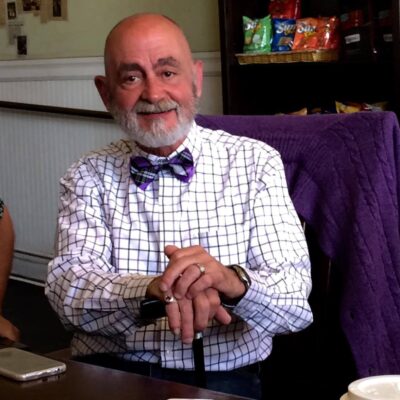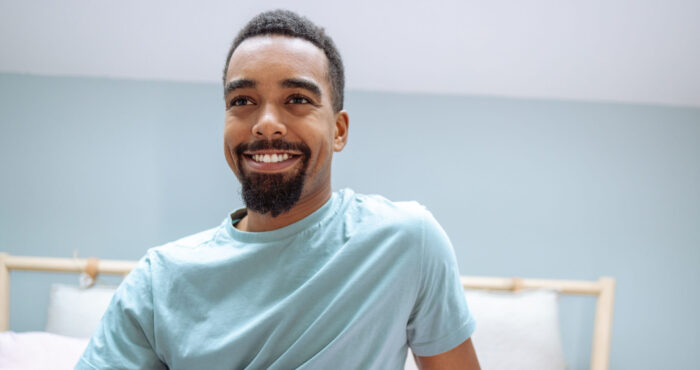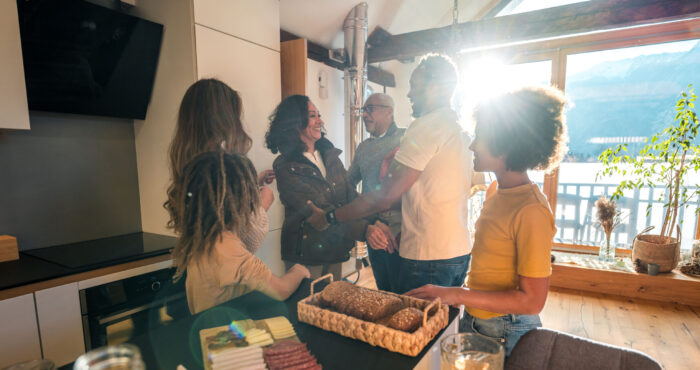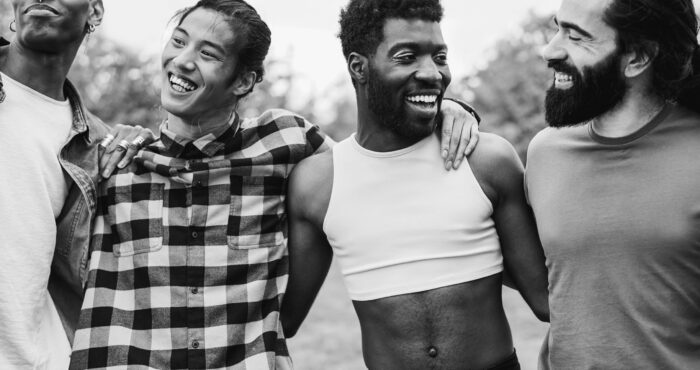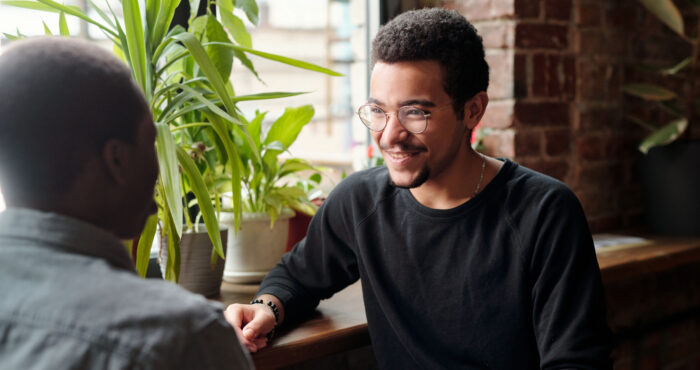On World AIDS Day, Vince Crisostomo reflects on more than 35 years of service to the AIDS Generation

When Vince Crisostomo volunteered as a buddy to visit terminally ill HIV/AIDS patients in New York City hospitals in 1985, he had no inkling that he would make his life’s work serving the AIDS Generation. In fact, he didn’t anticipate living past age 30.
He himself was diagnosed with HIV when he was twenty-eight years old, in 1989, and was told that he likely wouldn’t live longer than a couple of years.
Crisostomo said his activism and community work has been inspired over the years by the loss of his partner, Jesse Solomon. Crisostomo met Solomon in 1988 in New York City. The couple moved to San Francisco in 1990 and were among the first fifty couples to register at City Hall as domestic partners. On October 6, 1991, Jesse died of AIDS-related complications. “Jesse’s death was devastating, of course. But his spirit informs my work every day,” Vince told me when I interviewed him in 2017 for A&U Magazine.
On World AIDS Day 2024 (December 1), the National AIDS Memorial Grove will honor Crisostomo with the Thom Weyand Unsung Hero Award.
Crisostomo is currently the Director of Aging Services at San Francisco AIDS Foundation, where he oversees programming for intergenerational groups that serve people over age 50, who are both HIV-negative and living with HIV and AIDS. He serves as co-chair of the Dignity Fund Oversight Committee which oversees the Dignity Fund and programs and services of the Department of Disability and Aging Services, and is actively involved in the HIV Advocacy Network at SFAF. Previously, he has worked across the U.S. and globally directing HIV program operations, in advocacy, and in education. He was the first Chamorro to come out publicly as a person living with HIV, and continues to share his story publicly to raise awareness of the issues faced by long-term HIV survivors and to decrease stigma. In 2015, he was named one of the POZ Magazine’s 100 most influential people living with HIV.
“Vince, through his life’s work in the fight to serve those with HIV/AIDS and to improve the lives of so many has been an inspiration to so many,” said John Cunningham, Chief Executive of NAMG. “Vince has always been at the table and through his passionate work has brought such profound impact to those living and thriving with the virus. Vince’s commitment to those aging with HIV/AIDS has been groundbreaking and improved so many lives. As we honor Vince in so many ways, he walks along the same path that Thom Weyand walked over his decades of service. We are so honored to bestow the Thom Weyand Unsung Hero Award upon a true hero in our community and around the world.”
Cunningham explained the name of the award after Thom Weyand, saying, “Thom was a gentle, humble soul who through his passionate commitment to improving the lives of the community, inspired others to get involved. He did not desire the spotlight, instead often opting to deliver impact from behind the scenes. His work to help steward the AIDS Memorial Grove to become a National Memorial will live on forever.”
I interviewed Vince on Thursday, November 8 for this article. The interview has been edited for clarity and length.
Hank Trout: Congratulations on your upcoming receipt of the Thom Weyand Unsung Hero Award! That’s quite an honor.
Vince Crisostomo: Thank you. You know, it’s funny because I’m getting awards from people whom I know, whom I actually worked with. I never worked with Thom, but earlier this year I received the George Choy Award from the Gay Asian Pacific Alliance. George Choy was part of the Asian community that I had worked with. He was an activist, he was openly HIV-positive, one of the few people at the time, and he was a friend.
HT: Can you tell me a little more about your work at SFAF right now—what work do you oversee, and what communities do your programs serve?
VC: We’ve expanded our programs in recent years. I think that we [SFAF] were the first AIDS-related organization to have a department of aging services. Other groups have had individual programs, but we have an entire department devoted to aging services. The Elizabeth Taylor 50-Plus Network provides community, connection, and aims to reduce social isolation among gay, bisexual, and trans men. We also have a transgender and non-conforming group, TGI Aging.
We see a lot of people through our community events. At one point, we were drawing from seventy to ninety people to our weekly dinners. Covid kind of changed attendance, and we had to pivot to more virtual events.
I still remember, we went into seclusion in March, and we had planned a Dining Out for Life event in April. But because of Covid, everything was closed. So we arranged with our friends at the Sausage Factory to do take-out dinners. It was amazing to watch people coming out after not seeing them for a month. I remember some of the things people said to me about how they had forgotten about the Sausage Factory. Some of the guys shared with me that they had had their first date at the Sausage Factory with a partner who had passed and how they had sort of taken a lot for granted. But that period taught us a lot of things. It was very emotional. We did some writing workshops where we figured out that we really do need to start collecting people’s stories and experiences, because when we long-term survivors die out, those stories might be forgotten.
I enjoy incorporating advocacy and education work into our community support services. A few years ago, we wrote The San Francisco Principles 2020, which is an update to the Denver Principles and outlines the challenges and needs for people aging with HIV. I will forever remember September 18, 2020, because we launched the Principles, which was an update of the Denver Principles. Also, I lost my father on the 16th, two days earlier. People told me that they would understand if I didn’t come out for the Principles launch, but I was adamant, I was going to be out for the Principles. Then the San Francisco Board of Supervisors adopted the Principles in May 2022.
I’m part of the Long-Term Care Council, and also co-chair of the Dignity Fund oversight committee. So I’ve been able to advocate for HIV and aging issues at a much higher level. Also, I was put on the LGBTQ+ Advisory Committee for the San Francisco Human Rights Commission, which I had been on in the 1990s when we passed the first domestic partnership ordinance. We also made it illegal to discriminate on the basis of your sexual or gender identity. One of the first things we did once I re-joined was to update those policies.
HT: How do you define who your programs serve?
VC: Some people might make assumptions about who we serve, or think we only serve people living with HIV. But we’re very inclusive. We include people who are HIV-negative and people living with HIV because our focus is reconnecting people out of isolation and rebuilding community. People who have lived through the worst years of the HIV epidemic—who may be HIV negative—also may benefits from the community, social, education, and advocacy we facilitate. This year, 2024, HRSA defined who we’re talking about when we talk about long-term survivors or older people who contract HIV, which is the 50-Plus demographic, and lifetime survivors, the “dandelions,” people who were born with HIV, a lot of whom are in their forties now. We have some members who are HIV-positive but their partner is negative. There was a longing for transgender and non-confirming folks to have programs, so we teamed up with Open House and some of our other community partners to create some of that programming. We also started a program called HUES, Healing and Uniting Every Sister, which serves cisgender Black women. [He chuckles.] Instead of calling themselves long-term survivors, they are known as “mothers of the movement.” Another aspect of our work is bridging generations, which is part of our work through advocacy groups like HIV Advocacy Network. We have group members working in coalition with HIV activists of all ages.
HT: Do you remain optimistic about the future? Is it difficult to be hopeful?
VC: There have been great moments, but there have been a lot of frustrating moments too. Sometimes it feels like the world has moved on and just forgotten about HIV and AIDS. One of our consistent messages is “It’s not over yet.”
And given the state of politics around the world, that’s been like, “Oh my god, history is repeating itself, and not in a good way.” We still don’t know where all of this is going to end up; we can only hope that things go our way. And we can hope for the best.
But one of the things that we founded the Department of Aging Services on is the idea of “What kind of world do you want to age into?” I ask that of the staff that we’ve hired, I ask it of our community, and I share it in meetings because people don’t think about that. When we were in our twenties, people didn’t ask us what we thought we would be doing when we were in our fifties and sixties. I found out I had HIV when I was twenty-eight and was told I would never see thirty, and I thought, “that’s only a year-and-a-half away!” So one of the things that I think we’ve done very well in this community is living with this uncertainty—Are we going to be here? And I’ve found that that premise, “what is the world that you want to age into,” fits whether you’re in your twenties, your thirties, forties, fifties, or sixties. Maybe you’re going to retire. Maybe you’ll have only five years left, maybe less. But what is it that you want to be doing at the end?
During this election, a lot of people said they didn’t want Trump elected as president, and I asked, “So what are you doing to stop that? Are you out there knocking on doors? What are you doing?”
All we can do now is hope for the best. We don’t know where this is going to lead us. One of the things that living with HIV has taught me is, you don’t have to figure everything out right now. You don’t have to know where you could be five years from now. You can have an idea of where you’ll be and what you’ll be, but you don’t have to figure it out this very moment. You just need to make choices. I think what came out of my conversation with the loan officer at the bank is, you need to make optimistic choices, because optimism breeds hope. And hope is what we need to live with. Hope for a better world, hope for future generations.
HT: You’ve been at this for a long time now. Can you give us a sense of where your journey has taken you?
VC: I’ve been doing this work since 1985! I started in New York City. I lost my partner Jesse on October 6, 1991. Recently I was in New York during the thirty-third anniversary of his passing. It was quite a while that I had not been in New York at this time of year. So I retraced our first date. Our second date, he didn’t show up. I was pissed! I thought he had rejected me! But it turned out he had gotten sick, and instead of meeting me for our date, he had to go to the hospital. When he was in the hospital, he said, “Vince, I just want you to know that I’m sick and I’m in the hospital.”
Things in New York have changed so much. For instance, the restaurant we went to is gone now, I think it’s a yogurt shop or something. But the movie theater where we saw Long-Time Companion is still there. And I realized, things change but the love remains.
Jesse was the one who got me involved in paid AIDS-related work. I had volunteered but Jesse really motivated me to want to do something with my life in the time I had left. So I got involved in what became my career. I thought it was going to be maybe six months to a year, but it turned out to be my career, my life.
HT: How has advocacy changed since you first got involved?
VC: I’m on the Equity and Aging Subcommittee of the California Master Plan for Aging. We’re needed to go into different circles, it’s not about HIV. We have to advocate for HIV and HIV survivors, but we also need to go into the aging realm, because we weren’t expected to live to this age. And our lived experience is much different. In the last couple of months, I have spoken at several meetings which were broader than HIV, including other health disciplines. We advocate at the city and state level on issues including harm reduction. We advised NIH on recruiting strategies for community involvement in NIH studies. I spoke about my personal experience and all my work. There was a nurse there who said that they had started their career in the 1970s and had done HIV work for a brief time, and they had never imagined that someone would be standing before them thirty or forty years in the future and telling them that he survived.
HT: As I’m sure you know, the AIDS crisis was a unique moment that gay men and lesbians were able to put their differences aside and work together on a common cause.
VC: Lesbians came to our aid during the crisis, and we continue to expand the work to make it intergenerational and intersectional. There’s been a lot of progress around trans and gender non-confirming issues. I attended the American Society on Aging conference here in San Francisco, and I saw a lot of queer and trans kids doing aging work. Which was amazing! That’s really what brings me hope, seeing that these young folks somehow are picking up that mantle and bringing it into spaces where we didn’t make it into.
HT: What do you see as the most pressing issue for those of us aging with HIV? What’s our number one priority?
VC: I think the most pressing thing is addressing the policies that need to change. Somethings are the way that they are because policy dictates it. Mainly I think we need healthcare for all in this country. We need to put people before profit. We need a universal healthcare system. I think Obama’s policies and the ACA have been helpful, but we need a system that doesn’t depend on who’s in office and who can take it away. Healthcare should be a human right. Every conference I attend, I wear my “Health Justice for All” t-shirt — I take that “All” literally. I mean, even if we don’t share the same political viewpoints, healthcare is something that should be guaranteed. It should not depend on who’s in office. It should not depend on who’s making a bigger profit.
I also think that, regarding a woman’s right to choose, as long as there are these gender imbalances, we’re never going to have an America that is equal. Honestly, for the life of me I cannot figure out why more of our community wasn’t up in arms around this issue. Women supported us when we needed. As you said, in the early and middle days of the pandemic, a lot of women put aside their fears and prejudices and supported our community. Then, when the end of Roe came around, we should have come together with women to fight back. My hope is that one day we can all come together, put those differences aside again, and really fight for equity in healthcare, and equity in all of our issues.
HT: What do you see as the major obstacles we face now?
VC: [He laughs.] People! I say that because at the Ryan White conference recently, I said that when my story is said and done, I don’t think that the fact that I survived AIDS will be my major accomplishment — it will be that I survived all the horrible, mean things that I’ve seen people do to each other, and didn’t become bitter. I think that comes from having hope. And having faith in humanity. I honestly have never thought it was a good idea to sit around thinking that people are making decisions purposely to make your life miserable.
But I do think the biggest obstacle is people. People are the ones who make the policy. People are the ones who vote for the policy. And ultimately, we’re just people. We’re people having an experience, and some people think they should dictate what other people’s experiences are. And I’m like, uh, didn’t your mother ever teach you to play well in the sandbox?
HT: I think we suffer from a loss of empathy. People see about two inches around themselves, and that’s it. They either can’t or don’t want to imagine what it’s like to walk in someone else’s shoes.
VC: You know, one of the things that struck me in the eighties, when I was doing hospital visits in New York… I remember sitting in the waiting room with this family, their young man didn’t look like he was going to make it, and his dad said to me, “Y’know what I’m going to miss most about him?” “No, I don’t,” I said. “The things that annoyed me about him, the things he did to annoy me.” “Really?” “Yeah, it just doesn’t seem normal, and now that we’re going to lose him, I’m realizing that I’m going to miss that.” And sometimes, that’s it. People might forget what you did but they don’t forget how you make them feel. And even if you were annoying sometimes, at the heart of it is love.
HT: What would you say now to that young Vince in 1985 when he volunteered as a buddy to visit terminally ill HIVAIDS patients in hospital?
VC: It’s gonna be fine. Whether you believe it or not, everything is working out. There was a song, I forget the name, that I listened to all during Covid, and there’s a line in it about “the wrong things aren’t meant to last.” There’s a lot of wrong in the world and eventually it will pass, but there’s also a lot of right in the world. So I would tell myself, lighten up, be here. I think that if I had known that I would still be here thirty-seven years after my diagnosis, I might have let go of more. There were years when I thought, you have to get this done, it has to happen, it’s all dependent on you. But I don’t feel that way anymore. If it’s not me it’ll be someone else. The last time I was asked this question, I said the same thing I tell my older self now — this is going to pass, this day will end and tomorrow’s another day.






